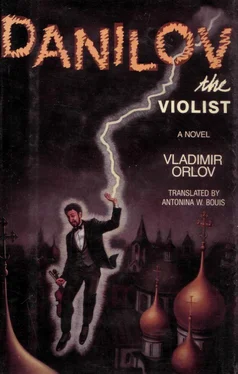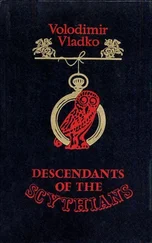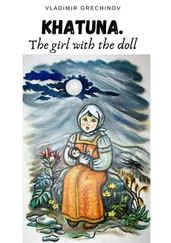Some twenty minutes later they were over Ostankino. And it began! Everything in the cloud took on motion, trembled, agitated, bubbled, a wild power suddenly aware it was capable of exploding. Somewhere below, cold air collided with warm, and finally the motion reached the cloud's ice cover and Danilov. He plunged down with the other ice crystals so as to turn into water vapor below. He plunged without looking back, desperately, shedding ions as he fell and taking on a negative charge. "This is marvelous!" thought Danilov as he felt the penetrating freshness of the new charge. "Marvelous!" But he knew this was only the beginning.
The free electrons were pouring from the cloud at a speed of one hundred fifty kilometers per second down to Earth. They punched a canal in the air for the lightning and for Danilov and, howling and thundering with pleasure, Danilov rushed toward Earth on the very tip of the lightning bolt. With blue sparks he crashed into the steel needle of the lightning rod of the Ostankino Palace. But he didn't go into the ground, he didn't neutralize or disappear; instead, pushing away from the rod as if repelled by it, he rose into the sky with an artillery roar, so wildly that he might have ended up anywhere if he hadn't checked himself and tumbled back into the cloud. And then over and over he fell to Earth with the lightning. Somersaulting and splashing sparks, he twice hit the steel rod, and the third time he got so carried away that he missed and splintered an old oak in the park near the sledding hill. That brought him to his senses. "Enough!" Danilov told himself. "That's it. You have to stop." And he hopped back up into the sky. He left behind a thoroughly chilled Moscow -- which, incidentally, was exactly what the Temirtau meteorological forecast had predicted.
Danilov was traveling at a good speed already, and he felt intoxicated. He needed to catch his breath. To tell the truth, Danilov had no need of a storm as a means of locomotion. He could fly wherever he wanted anyway. But he had grown accustomed to bathing in lightning. And not in ball or ribbon lightning, but in linear bolts. With rolling thunder. He scolded himself sometimes, with accusations of unforgivable vulgarity, but he could not, and would not, deny himself this longstanding weakness. Which was the case, incidentally, with many other of his weaknesses. But whereas the youthful Danilov had created thunderstorms for himself and, in the bliss of their rough and tumble, had felt himself to be Bonaparte commanding a battle of the elements, the present-day Danilov could not permit himself to be the cause of accidents and damage. Now he waited for natural storms, and in them he was no longer Bonaparte but ice crystals and water vapors.
After a rest, Danilov pointed a finger. And where he pointed, he flew -- this time to a tranquil spot in the Andes.
But as he flew he felt a crystalline itch throughout his whole body: Something was interfering with his hearing, and he wanted to sneeze. Danilov stopped, dug some repulsive gray matter from his ears, turned on his systems vacuums and cleaners, and shook out sand, finely ground glass, and captain's pipe tobacco from himself. Someone deliberately and meanly had stuffed glass and tobacco into the cloud, and Danilov hadn't noticed it while diving. Could it be the work of Valentin Sergeyevich? But that would mean that Valentin Sergeyevich had access to the atmosphere. "So let him!" thought Danilov. But he realized that the idea made him unhappy.
"Can even creatures like that have access now? ... Who is he, anyway?" And he flew on.
He had the right to fly with the speed of thought. Here he was in Moscow, he thinks he has to be in Upper Udalia, and right away he's in Upper Udalia. But Danilov found that kind of flying boring, and he moved with such speed only when he was absentminded or drunk. Usually he lagged behind thoughts. Rather, he interrupted the main thought with random thoughts, sometimes even silly ones, which, however, gave him pleasure. In a single flash he could also see and understand everything that lay in his path -- every human fate, every incident, every bug and every dust mote. But this was, in Danilov's opinion, like running through the halls of the Hermitage Museum in a half hour. He wouldn't be able to take anything to heart that way. Not a single nerve in his body would respond. All he would get for it would be a headache. That's why he did not look at everything en route, but only at what he wanted to, and then he'd really find out about it. For instance, he might set off to Japan to see his girlfriend Himeko on the island of Honshu, but suddenly he would hear the chime of some peculiar bells, and turn willy-nilly, to instantly find himself flying over a herd of sheep in the Tyrolean Mountains, where he would touch the bells with his finger as he passed. Or he would recall that he wanted to know whether Simenon had really stopped writing as he had heard on the radio, and without losing sight of the desirable Himeko, he would look into Simenon's Lausanne house, since it was nearby. Then he might be attracted by the aroma of roasting lamb in Rawalpindi or the cry of a child in a Manila suburb, and Danilov would quietly give the child a candy and wipe away his tears, then fly off to Himeko...
Today Danilov was flying strictly on course, not hurrying. Europe was below him. Ahead to the right Paris glittered, windows were lit in apartments known to Danilov in Paris proper and nearby in the gallant city of Sceaux. And a bit farther and to the left Danilov made out the grim casket Escorial; many times he had meant to peek into its halls and cellars to sweep out Philip II's black thoughts with a boxtree broom. But somehow he never got over there. And today he said to himself: "Next time for sure," and then recalled that there might not be a next time.
He flew, his arms pressed to his sides and his legs extended, but without any particular muscle tension. He had no wings, naturally. And who would dare wear a pair nowadays! The fashion for wings was passe, even for the heavy aluminum ones from jet planes, which had created such a sensation a mere fifteen years ago.
Danilov wasn't one of those people who would appear in public wearing felt boots, even if it were freezing. He was a sharp dresser. When it had been the custom to fly with rudder and sails, he flew with rudder and sails, but what sails he flew! Then there was a fad for wings, and Danilov was one of the first to have wings made. Many came to gawk at the Damascus steel frame, covered with rubberized material, which was layered on top with peacock feathers and black velvet below, and with veins of seed pearls embroidered on the velvet. Those wings were extraordinary, and now they lay in some storeroom. Danilov did not throw them away completely, because he found old things touching. Then diesel engines were fashionable, and bulb horns that made scandalous noises, motorcycle goggles, bent windshields, exhaust pipes with anodized mermaids, and other things -- who can remember them all? Then someone put on aluminum flats -- and that created a sensation ... it was madness! Many of Danilov's acquaintances picked up the most amazing wings -- from Boeings and from antediluvian Farmans, four each, and even from Concordes, which were then nonexistent. "Pfui!" said Danilov. He was flashy, sometimes too daring, but he not no desire to adopt every fashion that made it to the backwoods. After all, fashion is born in Paris or maybe Moscow, but it grows old in Fetezh and Maklakov. And by the time it reaches far-off Maklakov, it turns a dozen cartwheels and can't recognize itself any longer, when the Maklakov teenagers start wearing yard-wide bell bottoms with jingle bells and battery-powered light bulbs by their shoes. No, Danilov didn't bother with that, he got a pair of IL-18 wings and was satisfied. And now, when his acquaintances were all into space equipment, Danilov didn't run out to get a spacesuit or space capsule. He must be getting old, or just tired of innovation. And neither he nor his friends needed wings, or engines, or spacesuits, it was all just for fun! Colored beads for the natives!
Читать дальше












